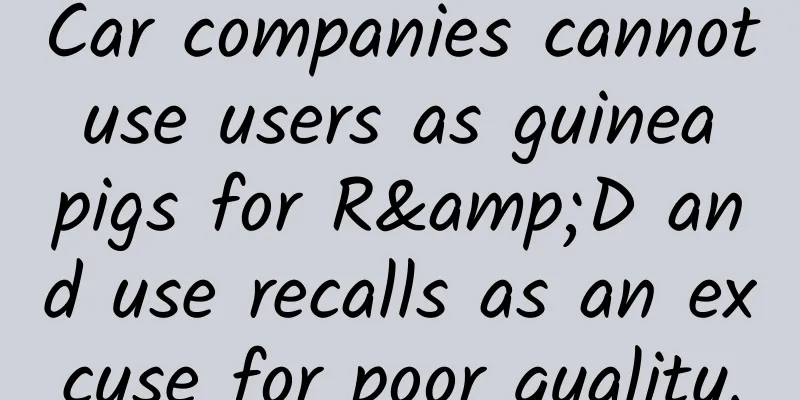Car companies cannot use users as guinea pigs for R&D and use recalls as an excuse for poor quality.

|
It is a good thing for car companies to actively discover problems and correct them in a timely manner. However, if "discovering problems" is based on sacrificing the legitimate interests of users, then this matter may have to be viewed from a different angle. Recently, the official website of the State Administration for Market Regulation showed that many automobile companies have filed vehicle recall plans, involving more than ten automobile companies including Hyundai Motor, Chery Jaguar Land Rover, SAIC-GM-Wuling, Dongfeng Honda, GAC Honda, BMW Brilliance, Tesla, BYD, Xiaomi, etc. The recalled new models are mainly new energy models. What does it mean that all car companies are collectively recalling their vehicles on a large scale, and they are all well-known big brands? Although we don’t know until the relevant national authorities give a definite conclusion, it is certain that the scale and frequency of recalls of new energy vehicles are indeed greater than those of previous fuel vehicles. Looking at the specific issues, for example, Tesla recalled a total of 1.2068 million vehicles this time, mainly due to abnormal functions of the rearview camera and the electronic power steering; Chery Jaguar Land Rover recalled a total of 108,800 vehicles, mainly because some vehicles' power systems may fail and the entertainment system software may trigger a black screen due to compatibility issues. BYD recalled 6,843 vehicles because the bolts of the internal electrical connectors of the integrated dual-motor controller of some BYD E-Class Leopard 5 plug-in hybrid vehicles may not have been tightened, which may cause smoke and fire in extreme cases, posing a safety hazard. SAIC-GM-Wuling recalled 1,116 Baojun Yueye vehicles due to problems with the electronic brake booster software system. Dongfeng Honda and GAC Honda have recalled a total of 1.3674 million vehicles due to steering gear problems in some vehicles that posed a safety hazard to steering operations. If we break down the recall reasons, the models that need to be recalled by automakers such as Tesla, Xiaomi, SAIC-GM-Wuling, and Chery Jaguar Land Rover all have safety risks in the software, while some models that need to be recalled by automakers such as BYD, Genesis, and Jiangsu Yueda Kia involve safety risks in the hardware. No matter what the cause is, in a nutshell, the problems with these vehicles will affect the user's vehicle safety and travel experience. Fortunately, these car companies are relatively responsible, and filing for recall also means that the corresponding vehicles will be properly handled, which can prevent these hidden dangers from affecting more users. Of course, the proactive recall by car companies also indirectly demonstrates the importance that regulators and manufacturers attach to consumer safety. Every recall is also a test and improvement of existing standards, which can accumulate experience for car companies and promote continuous progress in the entire industry. However, when car companies conduct recalls together, a more important question related to users begins to emerge: Can "recall" solve all problems? Can more tests be conducted before leaving the factory to try to solve the problems in the production line and even the product design process? Although automobile recalls are a self-correction mechanism for companies to deal with product quality issues, they may not be so worthy of recognition for consumers. Vehicle recalls mean that there are quality issues with the vehicle. I believe no one wants to wait and see for a car that is of poor quality and even affects travel safety. To put it bluntly, many vehicles nowadays are often only noticed by car companies after users discover problems and complain, and users sometimes act as "guinea pigs" in this process. Even if a recall is carried out, the inconvenience it causes to consumers can easily be ignored. In the new energy era, the intensity of recalls has increased dramatically. According to the data of the "2024 Automobile Recall Analysis Report", in 2024, the number of domestic automobile recalls exceeded 10 million for the first time, reaching 11.237 million vehicles. The sharp increase in recall numbers is closely related to the technological iteration of the car itself. As electrification and intelligent configurations become more common in automotive products, in addition to car failures related to the "three major components", software problems such as car computer systems and intelligent assisted driving have also begun to increase. Today is a period when the penetration rate of new energy vehicles continues to break through. The more recalls there are, the more consumers may buy problematic vehicles and passively become "experimental products" for some car companies to accumulate experience. Of course, the action of "recall" itself is definitely a good thing. In fact, automobile recall is the process of eliminating product defects by defective automobile product manufacturers in accordance with legal requirements and procedures. From the perspective of industry development, the awareness of automobile companies to actively "recall" problematic vehicles shows that companies are becoming more and more socially responsible, and consumers' rights are further protected, which is an improvement in the industry. A car is made up of tens of thousands of parts. In addition, the era of smart electric vehicles has enabled vehicles to have more and more intelligent electronic configurations. It is inevitable that some defects will appear in the vehicle. Therefore, we still need to look at the "large-scale recall of many models" objectively. Overall, the attitude of car companies that can take the initiative to recall when problems arise is worthy of recognition. Moreover, as the recall mechanism gradually improves, it will also be beneficial to the development of the industry and the protection of consumer interests. However, "recall" cannot be an excuse for car companies' poor quality. Forcing users to spend a lot of money to buy products and "test" them is a covert "crowd testing and crowdsourcing" behavior that will make it difficult for the brand to survive in the long run. Bian Que once said: The best doctor treats the disease before it occurs. For consumers, if the car company can find problems and solve hidden dangers before the car is delivered, it will definitely be far more meaningful than the subsequent "recall". |
<<: Infomax: Samsung Electronics' operating profit is expected to drop 27.8% year-on-year in Q1 2025
Recommend
Chris2020 Charm System Private Tutoring Course "Includes: Dating Master + Long-term Relationship"
Chris2020 Charm System Private Tutoring Course &q...
Universal tips for short video live streaming!
We all know that when live streaming sells goods ...
Why do users uninstall apps?
[[158313]] This article is from a high-quality an...
How to operate the CPS project of takeaway coupon public account?
You can often see advertisements like this on the...
GAC Aion: As of August 2023, the cumulative sales of the AION S series exceeded 400,000, ranking first in the A-class pure electric sedan
GAC Aion announced that the AION S series sold 22...
Apple's new patent is very creative: iPhone/iPad can be turned into a laptop in seconds
The US Patent and Trademark Office disclosed a new...
How to write an event planning proposal that will satisfy both your boss and your clients?
In today's business environment, it is extrem...
Why is the front of a high-speed train not square or round? Instead, it is designed as a "bullet head"?
Did you know that the high-speed rail is nickname...
Activity operation theme planning and front-end gameplay design
After implementing and determining the backend st...
Experience sharing on project development by leveraging strengths and weaknesses
[[228468]] The operation of a project should be o...
Pure electric vehicles are more environmentally friendly than hydrogen fuel. What do German researchers say?
A new study shows that pure electric vehicles out...
My rhinos keep going missing, but this is good news
Editor’s Note: September 22 is World Rhino Day. T...
LeEco and Evergrande: Two Ecosystem Benchmarks in China
Evergrande and LeTV are two great examples of cou...
The second phase of the advanced watercolor illustration course of Yi Qiqi will end in June 2021 [good quality]
The second phase of the advanced watercolor illus...
Zhang Chaoyang: Make the lives of Chinese netizens more enjoyable
With the rapid development of Internet technology...









![[Live] Technology or management, how should programmers plan their career path?](/upload/images/67ebd64600305.webp)